What is a Proxy Server: Everything You Need to Know
Take a Quick Look
Everything you need to know about proxy server is here. Unlock the full potential of proxy servers with AdsPower!
Privacy and security have become critical concerns for anyone accessing the internet. Whether you're a casual browser, a business owner, or an IT professional, the need to protect your online activities and data is more important than ever. Proxy servers are a powerful tool that can help safeguard your online presence.
But what exactly is a proxy server, and why should you care? This article will dive deep into the world of proxy servers. It will explain what they are, how they work, the types available, and why they matter in today's online landscape.
What is a Proxy Server?
A proxy server is like a middleman between your device (like your computer or phone) and the internet. Imagine you're sending a letter to someone, but instead of sending it directly, you give it to a friend first. Your friend then sends the letter for you, and when they get a reply, they give it back to you. In this scenario, the friend is acting as a proxy.
Similarly, when you send a request to access a website, your request goes through the proxy server first. The proxy server then forwards your request to the web server on your behalf. The response from the web server is then sent back to the proxy server, which in turn sends it to you.
Proxy servers can hide your identity online. This includes your IP address, online behaviors, browsing history, etc. When sending a request through proxy server, the Internet identify the proxy server instead of you. It protects your privacy, lets you access blocked sites, and can speed up your internet by saving copies of visited web pages.
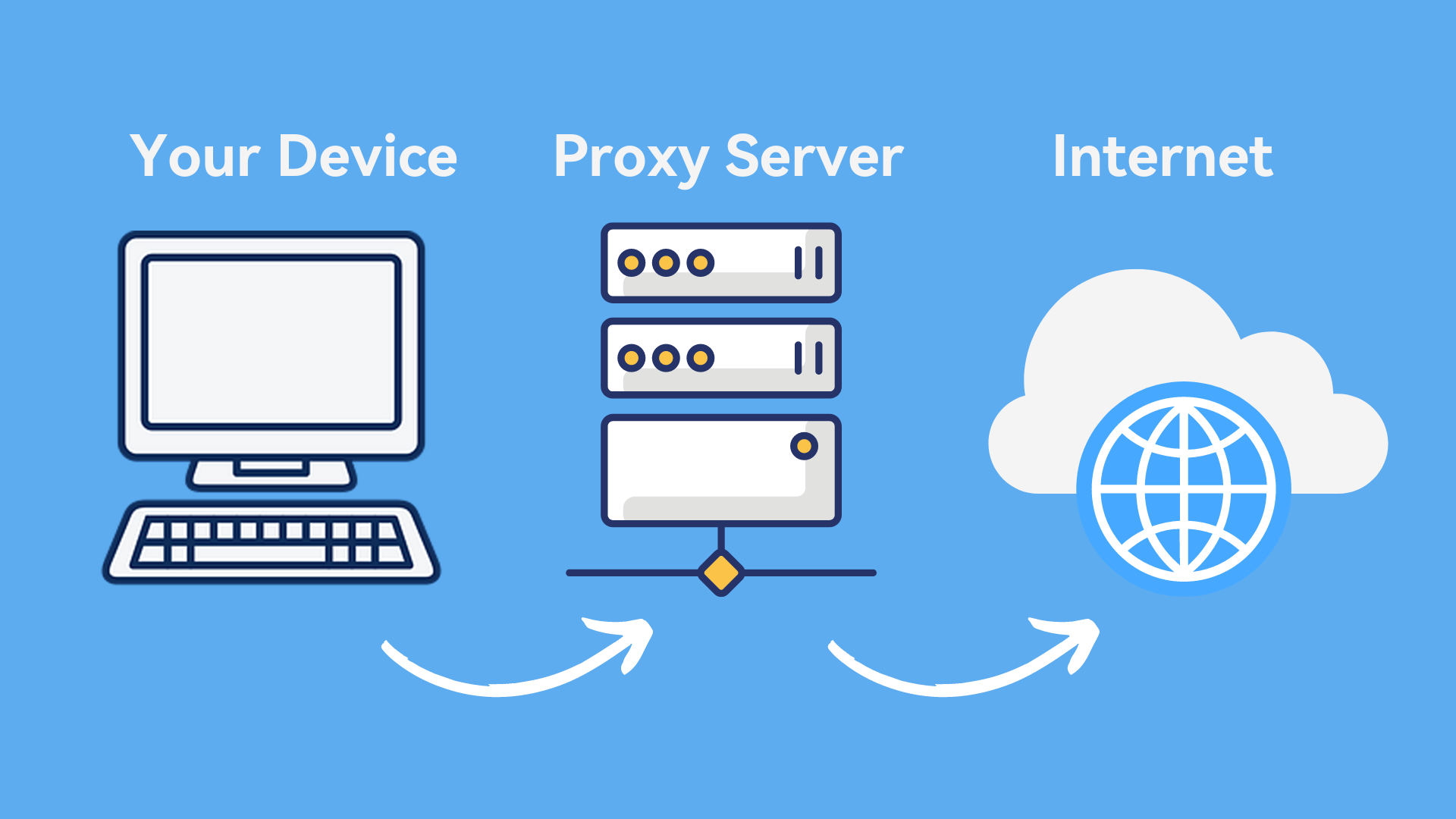
How Does a Proxy Server Work?
To understand how a proxy server works, let's break down the process step by step:
- Connection to the Proxy Server: When you configure your device to use a proxy server, all your internet traffic is routed through this server.
- Request Forwarding: When you want to visit a website, your device sends a request to the proxy server. The server then forwards this request to the website’s server on your behalf, using its own IP address instead of yours.
-
Response Handling: The website’s server processes the request and sends the data back to the proxy server. The proxy server then forwards this data to your device.
-
Data Delivery: Finally, the data is delivered to your device, allowing you to access the website. Throughout this process, the website only sees the IP address of the proxy server, not your actual IP address. This process effectively hides your identity and location, making it harder for websites to track your online activities.
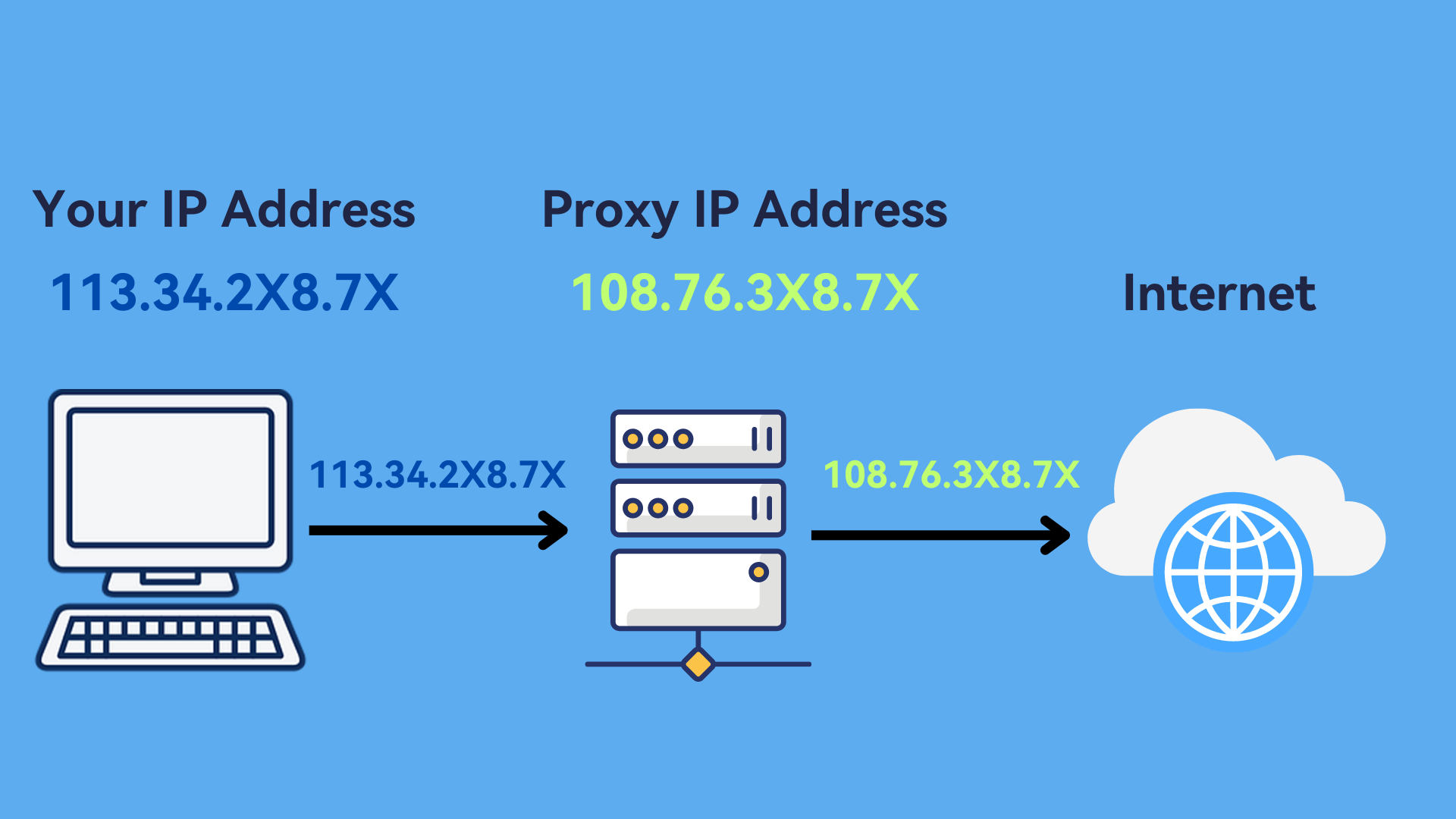
Why Use a Proxy Server?
There are several reasons why individuals and organizations use proxy servers. Here are some of the most common benefits:
-
Protecting Privacy: A proxy server helps protect your privacy online by masking your IP address and encrypting your internet traffic. This makes it more difficult for third parties to track your online activities. This is especially important in an era where companies are constantly monitoring online activities. In fact, according to a 2023 report by Statista, global privacy concerns have risen sharply. About 70% of respondents feel more worried about identity theft than they did a few years ago.
-
Bypassing Geo-Restrictions: Many websites and online services restrict access based on geographical location. With a proxy server, you can bypass these restrictions and access content from anywhere in the world.
-
Improving Security: Proxy servers can act as a firewall, filtering out malicious websites and protecting your device from potential threats. They can also be configured to block certain types of content, such as ads or adult websites.
-
Enhancing Speed and Performance: Some proxy servers can cache frequently accessed content. This reduces the amount of data that needs to be downloaded. This can save bandwidth and improve loading times for websites.
Main Types of Proxy Servers
There are several types of proxy servers, each serving a different purpose. Understanding the differences between them is crucial for selecting the right proxy for your needs. Below, we introduce several main types of proxies based on different criteria.
Proxy Types Based on Protocol
1. HTTP Proxy
These proxies are designed to handle HTTP (Hypertext Transfer Protocol) requests. They are commonly used to access websites and online services. HTTP proxies are straightforward and easy to configure. So, they are a popular choice for general web browsing.
2. HTTPS Proxy
An HTTPS proxy is similar to an HTTP proxy but provides an added layer of security. It encrypts your data, ensuring that your internet traffic is secure and cannot be intercepted by malicious actors. HTTPS proxies are ideal for accessing secure websites and handling sensitive information. According to Google, over 95% of web pages loaded in Chrome are now encrypted using HTTPS.
3. SOCKS Proxy
SOCKS (Socket Secure) proxies are versatile and can handle a variety of internet traffic, including HTTP, HTTPS, FTP, and more. They are often used for online gaming, file sharing, and streaming, where a stronger proxy is needed. SOCKS5 proxies, in particular, are praised for their enhanced performance and security features. For example, SOCKS5 proxies are popular in industries such as finance and healthcare. They prioritize secure data transmission.
Proxy Types Based on Anonymity Level
1. Transparent Proxy
A transparent proxy does not hide your IP address from the websites you visit. It is often used by organizations to monitor and control internet usage. For example, schools and workplaces might use transparent proxies to enforce internet policies.
2. Anonymous Proxy
As the name suggests, anonymous proxies are designed to hide your IP address, allowing you to browse the internet anonymously. They do not reveal your identity or location to the websites you visit, making them a popular choice for privacy-conscious users.
3. High Anonymity Proxy (Elite Proxy)
These proxies offer the highest level of anonymity by not only hiding your IP address but also masking the fact that you are using a proxy server. They are ideal for users who need maximum privacy and security.
Proxy Type Based on IP Origin
1. Mobile Proxy
Mobile proxies use IP addresses assigned by mobile carriers. These proxies are useful for tasks that require simulating real mobile user behavior. Examples include app testing, localized marketing campaigns, and bypassing geo-restrictions on mobile devices.
2. Residential Proxy
A Residential Proxy uses an IP address that is provided by an Internet Service Provider (ISP) to homeowners or regular users. These IP addresses are tied to real physical locations and are assigned to actual devices like computers. This provides a high level of legitimacy and reduces the chance of being blocked by websites or flagged as suspicious activity.
3. Data Center Proxy
Data center proxies are not affiliated with ISPs but come from data centers. They are fast and scalable. They are often used for tasks that require many IPs, like web scraping or automated browsing. However, they are easier to detect than residential or mobile proxies.
These proxy types can be divided further into Static Proxy and Rotating Proxy. Static Proxy assigns a single IP address to users. This makes it less secure because it's easier for hackers to target and easier to trace. Meanwhile, the Rotating Proxy is designed to change IP address automatically. So, it's much safer.
Now you must be clear about the features of different types of proxies. To purchase reliable proxies, click here to check our suggestion. Each proxy provider has its unique features and provides various types of proxies for you to choose from.
Is There Any Limitation of Proxy Servers?
While proxy servers offer many benefits, they also have limitations.
-
Limited Security: While proxy servers can provide some level of anonymity, they do not offer the same level of security as VPNs. They may not encrypt your data, leaving you vulnerable to cyberattacks.
-
Performance Issues: Proxy servers, especially free ones, can suffer from slow speeds, frequent disconnections, and server overload due to high traffic.
-
No Complete Anonymity: Not all proxy servers provide high levels of anonymity. For example, transparent proxies do not hide your IP address at all, and some proxy servers may log your browsing activities.
-
Incompatibility: Some applications and websites may detect and block proxy servers, preventing you from accessing certain services or content.
-
Reliability: Free proxy servers can be unreliable, with limited server locations, unpredictable performance, and a higher risk of data breaches due to weak security.
But don't worry, try to combine proxy servers with AdsPower! AdsPower can seamlessly integrate with a variety of proxy types. Whether you are using HTTPS, SOCKS, or other proxies, AdsPower can work with them.
While proxy servers provide a layer of anonymity by hiding your IP address, AdsPower takes this a step further. It allows you to create a separate virtual browser fingerprint for each profile. This isolates your online activities, preventing fingerprinting techniques that could otherwise link your accounts based on browser information. Combined with the use of proxy servers, AdsPower ensures that your online activities remain private and secure.
What's more, AdsPower helps manage multiple proxies efficiently. You can store purchased proxies in a list within the Proxies section. Within this section, users can change the proxy IP, check, edit, and delete a proxy.
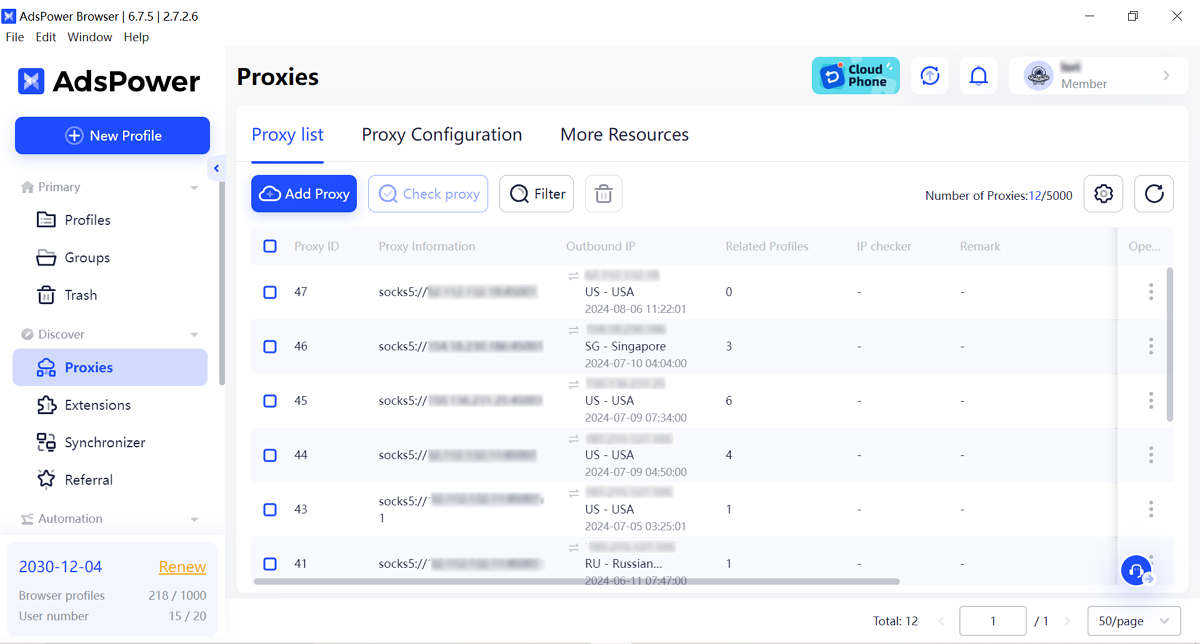
Conclusion
Take control of your online privacy and security now. Proxy servers are powerful tools to protect your identity, and with AdsPower, you can supercharge that protection. Manage multiple accounts seamlessly, bypass restrictions, and keep your online activities safe from prying eyes. Start using proxy servers and AdsPower today!

People Also Read
- How Ads Follow You Around the Internet and What You Can Do to Stay Private Online

How Ads Follow You Around the Internet and What You Can Do to Stay Private Online
Learn how ads follow you online, understand behavioral retargeting, and protect your privacy with AdsPower.
- AI Search Visibility Tracking Tools: How to Track Brand Visibility in AI Language Models
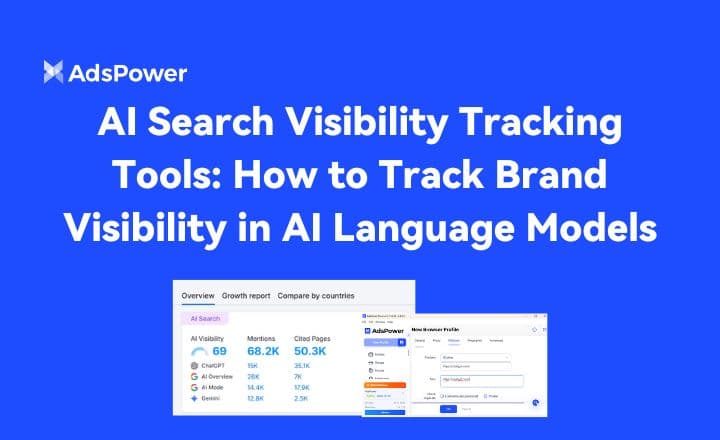
AI Search Visibility Tracking Tools: How to Track Brand Visibility in AI Language Models
Learn key metrics, tracking methods, and the best tools to monitor how AI language models mention your brand.
- TikTok Shop Selling Guide 2026: How to Start, Grow, and Scale

TikTok Shop Selling Guide 2026: How to Start, Grow, and Scale
TikTok Shop guide 2026 explains how to sell products, find top-performing items, drive traffic, use affiliates, and scale safely.
- How to Fix ChatGPT Errors: Network, Message Stream & Access Issues

How to Fix ChatGPT Errors: Network, Message Stream & Access Issues
Fix ChatGPT errors caused by network drops, message stream breaks, and access issues. Use fast, practical steps to restore stable responses.
- How to Fix an IP Ban on Discord 2026?
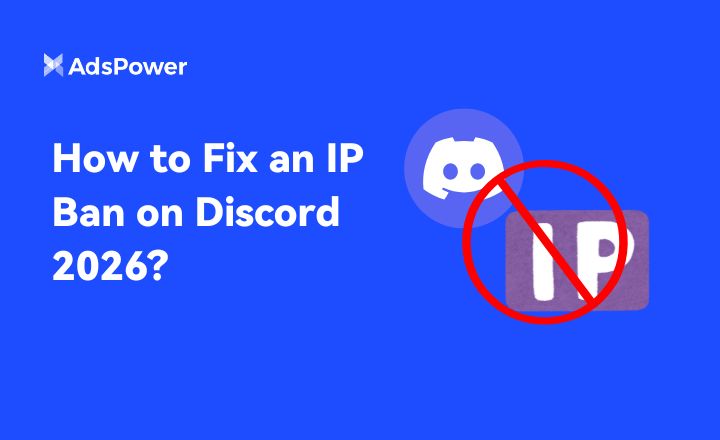
How to Fix an IP Ban on Discord 2026?
Discord IP bans block your network access. This 2026 guide explains how to detect, recover, appeal, and prevent IP restrictions so you can reconnect


